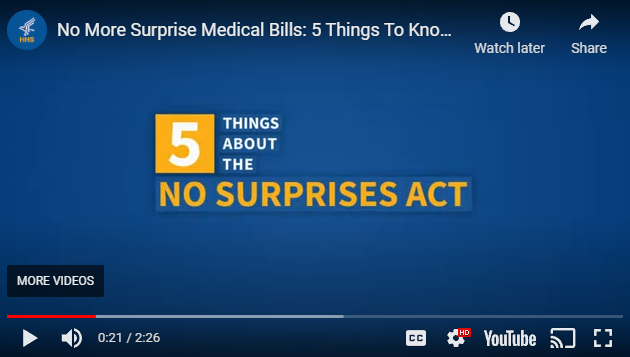No More Surprise Medical Bills: 5 Things To Know about the No Surprises Act Taking Effect in 2022
Posted by HHS.gov | Jan 03, 2022
Beginning January 1, 2022, new federal protections championed by the Biden-Harris Administration will shield millions of consumers from surprise medical bills—unexpected bills from an out-of-network provider, out-of-network facility or out-of-network air ambulance provider. The protections, implemented under the No Surprises Act, ban surprise billing in private insurance for most emergency care and many instances of non-emergency care. They also require that uninsured and self-pay patients receive key information, including overviews of anticipated costs and details about their rights.
In addition to shielding millions of consumers from surprise medical bills, these protections will further President Joe Biden’s work to promote competition in health care and other sectors of the American economy.
“The No Surprises Act is the most critical consumer protection law since the Affordable Care Act,” said Health and Human Services (HHS) Secretary Xavier Becerra. “After years of bipartisan effort, we are finally providing hardworking Americans with the federal guardrails needed to shield them from surprise medical bills. We are taking patients out of the middle of the food fight between insurers and providers and ensuring they aren’t met with eye-popping, bankruptcy-inducing medical bills. This is the right thing to do, and it supports President Biden’s vision of creating a more transparent, competitive and fair health care system.”
“The No Surprises Act offers significant relief to people across the country, and reinforces our fundamental belief that no one should go bankrupt when seeking necessary care,” said Centers for Medicare & Medicaid Services (CMS) Administrator Chiquita Brooks-LaSure. “We are making it easy for consumers to know and understand their rights under the law, including what they can do if they receive a surprise medical bill. Consumers will not only benefit from these rights, but also will be empowered with the knowledge to address potential violations.”
A recent report from the HHS Office of the Assistant Secretary for Planning and Evaluation (ASPE) reviewed key evidence on surprise billing and the need for the consumer protections in the No Surprises Act. The report showed that surprise billing is common among those with private insurance—nearly one in five patients who go to the emergency room, have an elective surgery, or give birth in a hospital receive surprise bills, with average costs ranging from $750 to $2,600 per episode.
For Insured Individuals, Protections from Surprise Medical Bills
For people who have health coverage through an employer, a Health Insurance Marketplace®, or an individual health plan purchased directly from an insurer, the rules that took effect January 1, 2022:
- Bans surprise bills any time you receive emergency care, and require that cost sharing for these services, like co-pays, always be based on in-network rates, even when care is received without prior authorization.
- Bans surprise bills from certain out-of-network providers if you go to an in-network hospital for a procedure. This means cost sharing for certain additional services during your visit will generally be based on in-network rates.
- Requires providers and facilities to share with patients easy-to-understand notices that explain the applicable billing protections and who to contact if they have concerns that a provider or facility has violated the new surprise billing protections.
For Uninsured Individuals, Better Advanced Knowledge of Costs
For people who do not have health insurance or pay for care on their own (also known as “self-paying”), the rules that took effect January 1, 2022 require most providers to give a “good faith estimate” of costs before providing non-emergency care.
The good faith estimate must include expected charges for the primary item or service, as well as any other items or services that would reasonably be expected. For an uninsured or self-pay consumer getting surgery, for example, the estimate would include the cost of the surgery, as well as any labs, other tests, and anesthesia that might be used during the procedure.
Uninsured or self-pay consumers who receive a final bill that exceeds the good faith estimate by $400 or more can dispute the final charges.
Where to Learn More—Help Desk and Website
Both insured and uninsured/self-pay individuals who are concerned that their rights have been violated now have access to a host of tools, including a help desk (available at 800-985-3059, 8am-8pm ET seven days a week; TTY: 800-985-3059) and webpage (CMS.gov/nosurprises), where more details on registering potential violations can be found.
Although some states have enacted laws to reduce or eliminate surprise billing, comprehensive nationwide consumer protections were not available. But now, the No Surprises Act builds a national baseline of protections with a series of final and proposed rules issued in 2021, which complement existing laws in states where they already exist and protect all consumers nationwide. For more information on these rules, visit:
- Biden-Harris Administration Announces Steps to Protect Consumers and Improve Ground Ambulance Billing Practices Through No Surprises Act Implementation
- Biden-Harris Administration Improves Transparency and Oversight of Prescription Drug and Medical Costs
- Biden-Harris Administration Advances Key Protections Against Surprise Medical Bills, Giving Peace of Mind to Millions of Consumers Plagued by High Costs
- Biden-Harris Administration Issues Proposed Rules to Promote Transparency in Air Ambulance Costs, Agent and Broker Compensation
- HHS Announces Rule to Protect Consumers from Surprise Medical Bills


Comments are closed